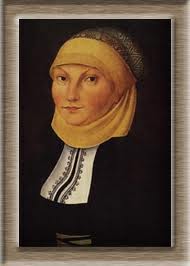I'm in a Luther State of Mind
I'm in a Luther State of Mind
January 14, 2014
Immersed in Luther this week, I have a couple of posts up my sleeve. The first is slightly unusual, in that I appear to have scooped Classical Frank, my music consultant in Mississippi, in noticing that a new cd, Luther's Wedding Day, has just been released which offers a putative reconstruction of the kind of music which Martin and Katie may have had to accompany their nuptials.
unusual, in that I appear to have scooped Classical Frank, my music consultant in Mississippi, in noticing that a new cd, Luther's Wedding Day, has just been released which offers a putative reconstruction of the kind of music which Martin and Katie may have had to accompany their nuptials.
The tale of the Luther wedding is always a fun one to recount in lectures. Suffice it here to note that any minister fortunate enough to marry a skilled home brewer is much to be envied. Mrs Luther was also a force to be reckoned with -- she sat for numerous portraits by the great Lucas Cranach the Elder and always complained that he never made her as beautiful as she really was.
The second is the release of the first volume of Bach's Lutheran Masses, to which I am listening as I write (surely some mistake -- Del). Interviewing Dr Diane Langberg last week, I asked her how she manages to maintain a healthy outlook on life when she is faced every day with dealing with ugliness and depravity. Among other things, she mentioned filling her life with as much beauty as possible, and mentioned Bach in particular. This cd is a great example of that.
Some may wonder why Luther retained the language of Mass in a Protestant context, after he had repudiated the theology associated with the medieval sacrament. In fact, the decision was in large part a pastoral one. Luther was very conservative aesthetically, partly because he was aware of how disruptive the Reformation was for ordinary people. Thus, he did not want to upset them more than necessary and, if he could retain the old forms but fill them with new Reformation content, then so be it. Thus, the word was retained whilst the theology and the liturgy were transformed.
after he had repudiated the theology associated with the medieval sacrament. In fact, the decision was in large part a pastoral one. Luther was very conservative aesthetically, partly because he was aware of how disruptive the Reformation was for ordinary people. Thus, he did not want to upset them more than necessary and, if he could retain the old forms but fill them with new Reformation content, then so be it. Thus, the word was retained whilst the theology and the liturgy were transformed.
 unusual, in that I appear to have scooped Classical Frank, my music consultant in Mississippi, in noticing that a new cd, Luther's Wedding Day, has just been released which offers a putative reconstruction of the kind of music which Martin and Katie may have had to accompany their nuptials.
unusual, in that I appear to have scooped Classical Frank, my music consultant in Mississippi, in noticing that a new cd, Luther's Wedding Day, has just been released which offers a putative reconstruction of the kind of music which Martin and Katie may have had to accompany their nuptials. The tale of the Luther wedding is always a fun one to recount in lectures. Suffice it here to note that any minister fortunate enough to marry a skilled home brewer is much to be envied. Mrs Luther was also a force to be reckoned with -- she sat for numerous portraits by the great Lucas Cranach the Elder and always complained that he never made her as beautiful as she really was.
The second is the release of the first volume of Bach's Lutheran Masses, to which I am listening as I write (surely some mistake -- Del). Interviewing Dr Diane Langberg last week, I asked her how she manages to maintain a healthy outlook on life when she is faced every day with dealing with ugliness and depravity. Among other things, she mentioned filling her life with as much beauty as possible, and mentioned Bach in particular. This cd is a great example of that.
Some may wonder why Luther retained the language of Mass in a Protestant context,
 after he had repudiated the theology associated with the medieval sacrament. In fact, the decision was in large part a pastoral one. Luther was very conservative aesthetically, partly because he was aware of how disruptive the Reformation was for ordinary people. Thus, he did not want to upset them more than necessary and, if he could retain the old forms but fill them with new Reformation content, then so be it. Thus, the word was retained whilst the theology and the liturgy were transformed.
after he had repudiated the theology associated with the medieval sacrament. In fact, the decision was in large part a pastoral one. Luther was very conservative aesthetically, partly because he was aware of how disruptive the Reformation was for ordinary people. Thus, he did not want to upset them more than necessary and, if he could retain the old forms but fill them with new Reformation content, then so be it. Thus, the word was retained whilst the theology and the liturgy were transformed.




